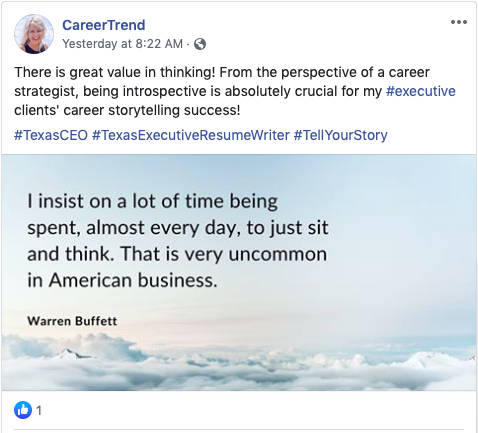Like Julie Walraven, of Design Resumes, who reminds friends and followers on her personal page about the work that she does.
She’s also very transparent about challenges in her work — especially technical issues. Julie is also is quick to recognize partners, which amplifies her reach when she tags them, but also helps them feel good about working with her!
Or Jacqui Barrett-Poindexter, who shares helpful hints on her personal Facebook page while also talking about the in-depth branding work she does with clients. She does an excellent job highlighting her work on her personal page without being sales-y. (And uses hashtags very effectively.) Jacqui also is quick to praise and share, tagging colleagues and other pages.
Some of her posts are just fun, and give her friends and followers an opportunity to interact. (In this case, there were several “I feel ya” and “Truth!” comments.) We’ve all been there!
Jacqui is a prolific writer and blogger too, and showcases links to her recently published work on her business page, CareerTrend. It’s a great resource for her target audience of executives.
Nickquolette Barrett, of iRock Resumes, also does social media marketing effectively. She particularly does Facebook Live and video well. Here’s a post where she shared some interviewing tips with her audience after participating in a hiring event. (Make sure you ensure the privacy settings for these posts are PUBLIC so they can be shared by your audience!)
Nickquolette also does a great job of branding the tips that she shares on her business page for iRock Resumes. (And incorporates in relevant hashtags!)
Brenda Cunningham, of Push Career Management, uses Facebook Live in her weekly “Open Phones” offering. Her branded graphic on her business page is attention-getting.
These resume writers are gaining visibility and engagement — building their “know, like, and trust” with people who already know them — people who are either in a position to use their services themselves, or refer people they know.
But social media marketing is something that can be intimidating to resume writers.
If you want to do more on social media, I have two recommendations:
- Currently, Bronze members of BeAResumeWriter.com get access to 30 Ready-To-Use Social Media Graphics each month. These are seasonally specific images that are pre-sized for Facebook, Twitter, and Instagram. Each graphic includes an accompanying quote, or you can swap them out for different quotes. (You also get more than 300 inspirational quotes as part of your Bronze membership — they’re called “Positive Encouragement for Jobseekers” and can be found on the download page for the Ready-To-Use Social Media Graphics in the Paid Members section of the site.) I recommend branding them with your logo in Canva or PicMonkey before posting online.
Here’s an example:
(Original file, Facebook format)
After three minutes of work in Canva:
Easy. Then upload the graphic to either your personal Facebook page, or your Business page. (I uploaded it to my BeAResumeWriter.com Facebook page).
- Check out Angie Gensler’s Social Media Calendar. I purchased this last month and am starting to implement her ideas (and the accompanying images) into my social media marketing. She offers a free Social Media Cheatsheet you should check out.
Engaging in social media marketing takes just minutes a day, yet it can help you be the first person people think about when they need career services themselves, or know someone who needs help. Take inspiration from our colleagues who are doing it well, and give it a try!
Please note this post contains affiliate links and I may earn a commission if you click them and make a purchase. This is, of course, at no cost to you. Please read my disclaimer for more information.

















